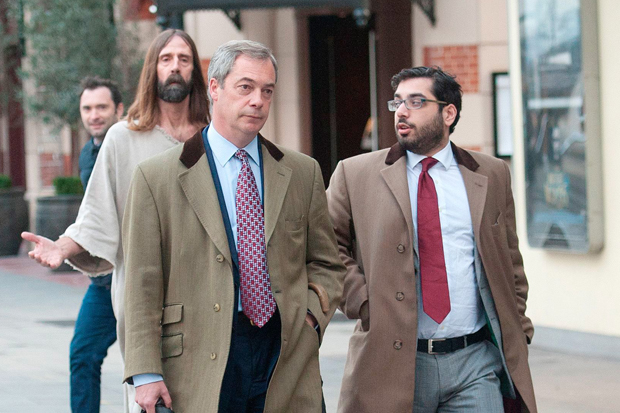Listen
What’s happened to poor Ukip? Not so long ago, they seemed unstoppable. They were revolting on the right, terrifying the left and shaking up Westminster. The established parties tried sneering at them, smearing them, even copying them. Nothing worked. Then came the general election, the centre held, and Ukip seemed to fall apart. Farage failed to win his target seat in South Thanet, the focus of his whole campaign. He resigned, then farcically unresigned, three days later.
The ‘Ukip wars’ followed: after an unseemly row over ‘Short money’ — the funding provided by the state for opposition parties in Parliament — Ukip started attacking itself through the media. Further leading figures have resigned and unresigned, or been sacked and unsacked.
Here’s the strange thing, though: the election was not a disaster for Ukip. It was a triumph. They won 3.9 million votes — 3 million more than in 2010, and 1.5 million more than the Liberal Democrats. If that rate of growth, or anything like it, were to continue, by 2020 Nigel Farage could well be prime minister. So why has the party sabotaged itself?
To begin to understand, it helps to cross the Atlantic and meet Stephen Bannon, executive chairman of a mysteriously rich right-wing website called Breitbart. Bannon is a tough cookie: a former ‘surface warfare’ officer in the US Navy and Goldman Sachs banker who in the 2000s turned his talents towards documentary-making and the crazy, querulous and lucrative world of the American radical right. In the early 2010s, as Ukip ascended, he saw a brilliant business opportunity.
The company Bannon runs is one of a large number of media organisations that exploit what Richard Hofstadter called the ‘paranoid style’ in US politics. Breitbart specialises in stoking up Middle American rage at big government and the liberal elite. Its founder, Andrew Breitbart, was a charismatic muckraker who worked with Matt Drudge, author of the Drudge Report and probably the most influential right-winger of the internet age. Breitbart’s site was generating huge amounts of online traffic when suddenly, at the age of 43, he dropped dead. (The coroner said heart failure; some of Breitbart’s keenest admirers say that he was poisoned by Barack Obama’s secret agents, which says something about them.) People expected Breitbart’s website to die with him but, under Bannon’s stewardship, it just got bigger. It is today a profitable company — though its press office refuses to say where the profit comes from.
The rise of Breitbart on the new media scene chimed nicely with the rise of the Tea Party, the amorphous movement within American conservatism that rose to prominence after the election of Barack Obama and the financial crash. Breitbart became essential reading for embittered American right-wingers, of whom there is no shortage.
Steve Bannon already knew Matthew Richardson, Ukip’s general secretary, and he saw in Ukip a British Tea Party. He approached James Delingpole, the Spectator columnist and Ukip sympathiser, and a young man called Raheem Kassam. Kassam, from Uxbridge, had been kicking around the British online right for a few years. He had studied at the University of Westminster, alma mater of Jihadi John, and — perhaps in reaction to some of his fellow students — had become stridently pro-American. He created a website called Student Rights, for ‘tackling extremism on campuses’, and then a couple more sites that huffed about Islamism and the evils of liberalism.
Bannon was an admirer of Delingpole’s writing and saw in young Raheem an ideal apprentice. He took them out for lunch towards the end of 2013, and put them in charge of his Breitbart Londonproject. The company rented a swish office in Westminster, which included a handsome flat for Kassam to stay in. On 16 February last year, the site launched. ‘There is a growing global anti-establishment revolt against the permanent political class at home, and the global elites that influence them,’ said Bannon in a press release. ‘Today’s media establishment and conservative movement in the UK have become obsolescent and fundamentally uninspiring,’ added Kassam.
A spokesman for Breitbart insisted that the London office was not established to support any political party. Nevertheless, it didn’t take long for Breitbart London to become a Ukip cheerleader. Kassam, as managing editor, was a particularly eager apologist. When, for instance, the Daily Mirror published photographs of the Ukip leader walking with a blonde woman to a hotel at 3 a.m., Kassam leapt to Farage’s defence: ‘Implications surrounding sexual impropriety are wholly reprehensible,’ he wrote in a blogpost.
Breitbart staff were alarmed at the lack of editorial independence. ‘We effectively became the Ukip comms office,’ says one employee. ‘Any criticism of the sainted Farage was completely banned,’ says another. It’s understood that Delingpole and Kassam fell out over the site’s pro-Ukip line.
At some point (it’s not exactly clear when), Kassam started working directly for Farage. In Farage’s recent memoir, The Purple Revolution, he writes that after the Newark by-election in June, he ‘tasked Raheem with planning a US trip to help meet campaign experts who worked for both the Democrats and the Republicans’. In September, Farage, Kassam and Matthew Richardson went on a four-day trip to America. By October, Farage had officially hired Kassam as his senior adviser.
British politicians are easily seduced by American money and power, and it seems Farage, for all his anti-elitism, was no exception. In The Purple Revolution, he positively gushes about his four days in September in the land of the free. He describes a friendly meeting with Rupert Murdoch (‘We are both outsiders who despise the establishment’), an equally amicable encounter with presidential hopeful Rand Paul (‘my political doppelgänger’) and a dinner, hosted by Breitbart in their Washington office overlooking Capitol Hill, in which he sat next to Senator Jeff Sessions of Alabama, a Tea Party darling, and the popular talk-radio host Laura Ingraham.
It must have felt like the beginnings of a special relationship. By learning from American experts, Farage believed he could turn Ukip into a more professional outfit. Kassam and Richardson put him in touch with strategists and activists who specialised in ‘micro-campaigning’ and social media. At the same time, Breitbart and the Tea Party’s leadership saw in Farage a man with whom they could do business — a conservative quite unlike David Cameron, who had spent so long toadying up to Obama. Moreover, the Americans wanted to learn from Ukip how a new party could rattle the established order — since the Tea Party, for all its noise, had never broken out on its own, or caused any meaningful shift in the Grand Old Party.
Back home, Ukip staff quickly got fed up with what they called the ‘Tea Party tendency’ and Farage’s ‘mad love affair’ with the American right. In February, Farage annoyed his followers by missing the first day of Ukip’s spring conference in Margate because he was giving a speech to a half-empty room at the Conservative Political Action Conference in Washington. ‘The party was seething and baffled,’ says one insider. ‘It was a major moment for Ukip and the leader wasn’t there.’
There were also growing concerns about a change in Ukip’s ‘messaging’. Farage is said to have developed a ‘shock and awe’ strategy, which involved making deliberately outrageous statements to arouse the ire of the despised political and media class. For instance, in a television debate, Farage suggested that the NHS should not treat foreigners with Aids. That prompted fury from politically correct commentators, as expected, but it also disturbed quite a few natural conservatives. ‘Shock and awful,’ said a senior Ukip source.
In an interview with Trevor Phillips, Farage also referred to a ‘fifth column’ of Muslims in this country — which led to rumours that, rather than running an election campaign, he was aiming for a well-paid gig on Fox News.
Others were embarrassed by the pettiness of the squabbles which the party found itself fighting. For instance, after the Sunday Times journalist Camilla Long joked on Have I Got News for You that she had spent more time in South Thanet than Farage, Ukip complained to Kent police. Kassam, by this point running Farage’s personal campaign in Thanet, claimed she had ‘made false statements about a candidate at this election’ and accused the BBC of contravening the 1918 Representation of the People Act. The complaint was duly ignored. ‘Anybody with the slightest idea of Ukip’s relationship with the press would have seen it was ludicrous,’ says a party insider, ‘but decisions in Thanet were being made in a vacuum.’
Farage also became much more aggressive on social media, adopting a style out of keeping with his amiable and old-fashioned public persona. The Ukip leader is a techno-phobe. He doesn’t have an email account and despises ‘those handheld machines that waitresses pass you in restaurants to pay the bill’. In Kassam’s first week at Ukip, however, @Nigel_Farage got into a Twitter row with the comedian Frankie Boyle. Douglas Carswell, Ukip’s first MP, wanted the party’s election focus to be ‘hyperlocal’ — talking to people face to face about the difficulties in their lives — yet Farage was making national headlines by picking fights with celebrities.
Ukip seemed to be waging an American-style culture war — but the British didn’t appear to be interested. From October to election day, the party’s standing in the polls fell from 18 to 13 per cent. The dip can’t all be pinned on Ukip’s drift towards Tea Party politics, but a number of Kippers feel that Farage’s infatuation with America distracted him from his mission at a crucial moment, and unbalanced the delicate ecosystem that had allowed the party to flourish.
Which might explain why, after the election, Ukip’s leadership turned on itself so viciously. Suzanne Evans, the deputy chairman, was sacked after she used the word ‘divisive’ about Farage. Patrick O’Flynn, economics spokesman and leader of the ‘red Ukip’ faction, called him ‘snarling, thin-skinned and aggressive’ and resigned soon after. Douglas Carswell, now the party’s only MP, is isolated. The party seems to have lost its sense of direction.
Ukip has for years been an odd mix of disempowered aristocrats, Tories in exile, and disaffected former Labour voters. Aside from a shared loathing of the metropolitan elite, few of its supporters have much in common with freedom-lovers such Andrew Breitbart and Stephen Bannon. The beer-fuelled party of Farage is different from the American Tea Party, which is in any case an incoherent and elusive movement. The British have their own paranoid style.
Raheem Kassam has now gone back to his old job at Breitbart. Nigel Farage has pledged to lead Ukip until 2035. But his political star is fading and his party is a mess. He can take comfort from the fact he has just been hired as a columnist for Breitbart London.
Got something to add? Join the discussion and comment below.
Get 10 issues for just $10
Subscribe to The Spectator Australia today for the next 10 magazine issues, plus full online access, for just $10.















Comments
Don't miss out
Join the conversation with other Spectator Australia readers. Subscribe to leave a comment.
SUBSCRIBEAlready a subscriber? Log in